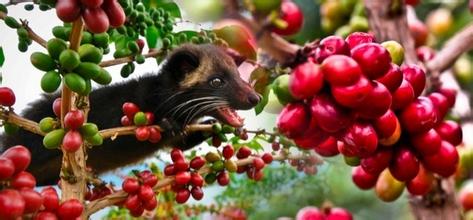Where is the best place for coffee trees to grow and grow? Requirements for planting conditions of boutique coffee
Coffee tree in botany belongs to the Rubiaceae coffee subgenus evergreen tree, and commonly known as coffee beans, in fact, coffee tree fruit seeds, only because of the shape like beans, so called coffee beans.
Climate is the decisive factor for coffee cultivation. Coffee trees are only suitable for growing in the tropics or subtropics, so the zone between north and south latitudes is most suitable for coffee cultivation. This coffee-producing zone is commonly referred to as the "coffee belt" or "coffee zone."
However, not all the land in this area can produce good coffee trees. The ideal planting conditions for coffee trees are: a warm climate with a temperature between 15 ° C and 25 ° C, and rainfall throughout the year must reach 1500 mm to 2000 mm, and its rainfall time should match the flowering cycle of coffee trees. Of course. In addition to seasonal and rainfall coordination, there must be fertile soil. The best soil for coffee is fertile, well drained, pozzolanic soil. In addition, although sunlight is an indispensable element of coffee growth and fruit, too strong sunlight will inhibit the growth of coffee trees. Therefore, various producing areas usually cooperate with planting some shade trees, generally planting bananas, mangoes and legumes and other tall plants. As for the ideal altitude of 500 meters to 2000 meters, therefore, growing at 800 meters to 1200 meters above sea level Jamaica Blue Mountain coffee quality is the best.
It can be seen that the conditions for cultivating high-quality coffee are quite strict: sunlight, rainfall, soil, temperature, and the way coffee beans are harvested and produced will affect the quality of coffee itself. Hebei is not an ideal area for coffee cultivation.
Although coffee trees are not suitable for cultivation in Hebei, there is a grass coffee that can be planted in most parts of the country.
Coffee tree cultivation conditions
However, not all the land in this area can produce good coffee trees. The ideal planting conditions for coffee trees are: a warm climate with a temperature between 15 ° C and 25 ° C, and rainfall throughout the year must reach 1500 mm to 2000 mm, and its rainfall time should match the flowering cycle of coffee trees. Of course, in addition to seasonal and rainfall coordination, there must be fertile soil. The soil most suitable for coffee cultivation is fertile, well drained soil containing pozzolanic matter.
In addition, although sunlight is an indispensable element for coffee growth and fruit, too strong sunlight will ruin the growth of coffee trees, so each producing area usually cooperates with planting some shade trees, generally planting bananas, mangoes and legumes and other tall trees. The ideal altitude is 500 to 2000 meters. Therefore, Jamaica Blue Mountain coffee grown at an altitude of 800 meters to 1200 meters has the best quality. It can be seen that the conditions for cultivating high-quality coffee are quite strict: sunlight, rainfall, soil, temperature, and the way coffee beans are harvested and produced will affect the quality of coffee itself.
i) Introduction:
Coffee cultivation has always belonged to tropical African countries, while herbal coffee cultivation is a fashionable product that organically integrates cultivation with modern high-tech means. Suitable for planting in most parts of the country, Hong Kong Food Co., Ltd. in mainland China to set up conditional areas of planting base, planting production and development of herbal coffee.
(ii) Construction of base facilities:
The Chinese side shall provide facilities such as 100-1000 mu of cultivated land or non-cultivated land (barren hills and slopes, etc.) with legal procedures, while the foreign side shall provide original seeds and special fertilizers and be responsible for technology and buy back all products. To compensate for the original seed and special fertilizer, etc.
(iii) Benefits:
Herbal coffee growth period of 130-140 days (Shandong, for example) per mu dry beans about 400-600 kg, foreign repurchase 4 yuan per kg (foreign payment after delivery).
(iv) Conditions of cooperation:
The receiving institution must be an agricultural enterprise (station, point, etc.), which can also rely on the administrative protection of the Government.

Source: Network
Important Notice :
前街咖啡 FrontStreet Coffee has moved to new addredd:
FrontStreet Coffee Address: 315,Donghua East Road,GuangZhou
Tel:020 38364473
- Prev

How to better tell the good from the bad of coffee beans?
SCAA or SCAE's CUPPING standard can be read in a book. The customary treatment and flavor of each production area are very complicated, and the cost of learning such as flavor wheel is too high. Can you imagine asking someone who just wants a drink to understand the difference between cardamom and cherry one by one? Are they sure they won't go crazy when they see the picture below? Including the Eagle value that describes the degree of roasting, for regular coffee
- Next

Introduction and grading of Colombian coffee beans
Colombian Coffee our Colombian coffee producing area is located in the city of Hughton Bollivar in the Medellin region of the northern Andes in South America, where the climate is mild, humid and sunny. And our Fallorence Mountains are right here, and hard-working farmers are growing coffee along the highlands of these mountains. The mountain steps provide a diverse climate, which means that throughout the year
Related
- Guji coffee producing area of Guji, Ethiopia: Humbela, Shakiso, Wulaga
- What is the most expensive variety of Qiloso in BOP multi-variety group?
- How to store the coffee beans bought home?
- Why are Yemeni coffee beans so rare now?
- Ethiopian Sidamo all Red Fruit Sun Sun Santa Vini Coffee beans
- SOE is mostly sour? What does it mean? Is it a single bean? what's the difference between it and Italian blending?
- Is Italian coffee beans suitable for making hand-brewed coffee?
- How to choose coffee beans when making cold coffee? What kind of coffee beans are suitable for making cold coffee?
- Just entered the pit to make coffee, what kind of coffee beans should be chosen?
- Can only Japan buy real Blue Mountain Coffee? What are authentic Jamaican Blue Mountain coffee beans?

